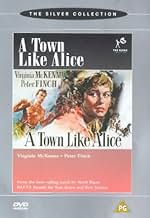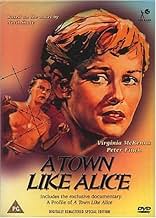I suppose that it should be confessed at the outset that I had the hots for Ms McEnna in her youth. Nevertheless, I still think that this is an excellent movie of the 1950's war genre.
Ginny and Peter Finch provide typically understated performances that are reminiscent of 'Ice Cold In Alex' and 'The Cruel Sea'. Solid, sterling, stiff-upper-lip-stuff that has no place in the spineless, simpering, metro-sexual third millennium.
I have never read Shute's novel, so I cannot comment on what liberties have been taken, but viewed without prejudice as a movie outlining Japanese brutality and human endurance it is still a well-realised piece of work. Everyone gives a thoroughly believable turn, both Caucasian and Oriental alike, as Ms McEnna's character concludes 'you can't really hate anyone' in the end. Though the Japanese - like their Nazi counterparts - did their very best to merit it.
Ms McKenna leads a group of unwanted western women and children, for whom no Japanese officer wants responsibility. So; they get shunted from one place to another, on foot, inadequately fed, and without medical assistance. Inevitably; they begin dying. Finch plays a captured Aussie running trucks for the Japanese. Filmed in black-&-white, in Britain and on location, it offers a very believable turn upon the miasmic swamps, crippling heat, humidity and deluging rain.
Of course, it's a love story too. And here again Ginny and Peter play their parts to perfection. I defy any true romantic not to be rendered lachrymose by her realisation of his survival and their final meeting at the end. Her hasty, last-minute application of cosmetics is particularly touching and well-observed. As if he'd care a hoot one way or the other.
It's a great old feel-good movie for the austerity generation. I give it nine stars and good luck to 'em all I say.
































